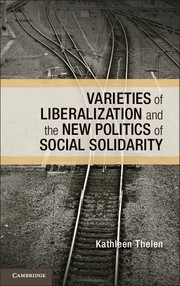Book contents
- Frontmatter
- Dedication
- Contents
- List of Figures
- List of Tables
- List of Abbreviations
- Preface
- 1 Varieties of Liberalization and the New Politics of Social Solidarity
- 2 Industrial Relations Institutions
- 3 Vocational Education and Training
- 4 Labor Market Policy
- 5 Coalitional Realignments and Institutional Change
- 6 The Future of Egalitarian Capitalism, in Light of Its Past
- Appendix A Components of Index and Descriptions of Variables for Figure 1.1
- Appendix B Components of Index for Figures 6.2 and 6.3
- Bibliography
- Index
3 - Vocational Education and Training
Published online by Cambridge University Press: 05 June 2014
- Frontmatter
- Dedication
- Contents
- List of Figures
- List of Tables
- List of Abbreviations
- Preface
- 1 Varieties of Liberalization and the New Politics of Social Solidarity
- 2 Industrial Relations Institutions
- 3 Vocational Education and Training
- 4 Labor Market Policy
- 5 Coalitional Realignments and Institutional Change
- 6 The Future of Egalitarian Capitalism, in Light of Its Past
- Appendix A Components of Index and Descriptions of Variables for Figure 1.1
- Appendix B Components of Index for Figures 6.2 and 6.3
- Bibliography
- Index
Summary
Skill formation forms a second arena of importance within the VofC literature – VET being one of several complementary institutions that distinguish LMEs from CMEs. LMEs feature systems that encourage the acquisition of general skills, while the systems of education and training in CMEs provide strong vocational training in industry- or firm-specific skills. These differences are important not just in economic terms; they also have relevance to the political and distributional outcomes of central interest in this book. In LMEs, educational stratification often reflects and reinforces economic inequalities. In CMEs, by contrast, well-developed vocational tracks traditionally have offered opportunities for working-class youth to move into stable and relatively well-paid work, especially in manufacturing.
The transition to the new “knowledge-based” economy poses important new challenges to both models (Morel et al. 2011: 1). The outsourcing of lower-skilled manufacturing jobs and the automation of production and services have transformed the kinds of competencies and skills required in these political economies. The relevant changes involve “not only a shift away from more narrow job-specific skills toward broader, more analytic general skills…[but also] a much more rapid turnover in the content…of training than in the past” (Mayer and Solga 2008: 2). This chapter considers the ways in which different national systems of education and training have been reconfigured to address these new challenges.
- Type
- Chapter
- Information
- Publisher: Cambridge University PressPrint publication year: 2014
- 2
- Cited by

